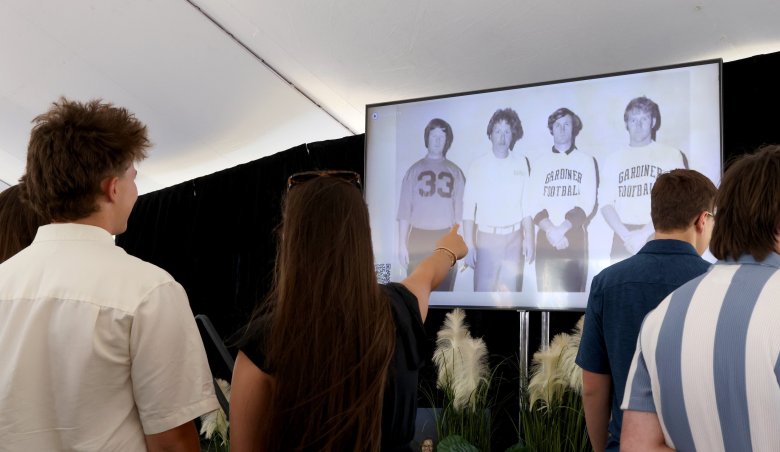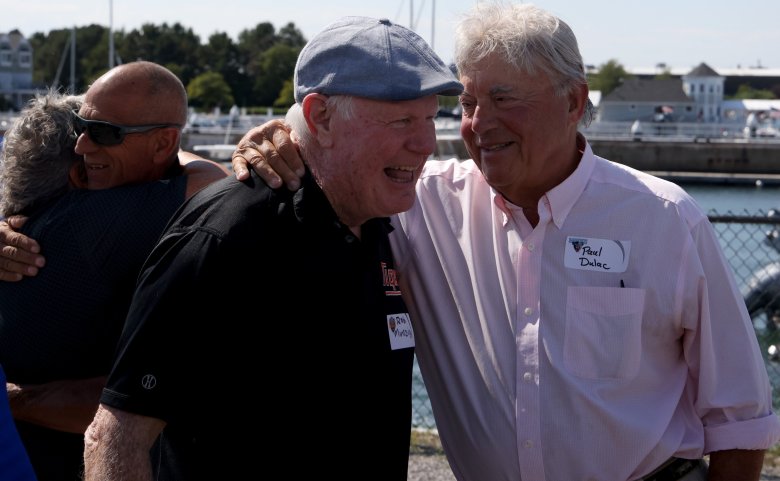
SOUTH PORTLAND — The footballs and championship rings spoke volumes — not just in number but in how they told a story of a legendary coach’s timelessness.
Laid out on a table beneath an awning at Port Harbor Marine were 11 state championship rings and nine footballs commemorating some of the biggest moments of John Wolfgram’s coaching career. Some of the older ones were faded, but those of Maine’s winningest high school coach’s more recent exploits were good as new.
“From his first championship to his last championship was 37 years, which was remarkable,” said Aaron Filieo, a former player under Wolfgram who is now the head coach at South Portland. “It’s a visual representation of his reach and of just how many people he’s inspired in more than 50 years as a head coach. Everywhere he’s gone, he’s been an icon.”
That was a sentiment echoed by many Saturday as hundreds gathered for Wolfgram’s celebration of life. The former Madison, Gardiner, South Portland and Cheverus coach, who went 302-91-1 with 10 state titles (he also won a title as an assistant coach at Cheverus), died Aug. 5 at the age of 77.
Saturday’s event drew mourners from all over the state, including many of Wolfgram’s former players and assistants and others in the Maine high school community. Gardiner and South Portland were particularly well-represented, and one of Wolfgram’s former players, Mooch Davis, had ties to Wolfgram at both schools.
Davis’ junior and senior seasons at Gardiner (1975 and 1976) were Wolfgram’s first with the program. Davis then moved to South Portland, and after Wolfgram became the head coach at South Portland in 1986, Davis became the team’s play-by-play announcer.
“My sophomore year, we were 0-10, and he took that same team the next year and went 5-5,” Davis said. “He just had the most incredible discipline and attention to detail. He was like Bill Belichick before Bill Belichick.”
Others who gathered Saturday, including Norm Gagne — the second-winningest coach in American high school hockey history — also recalled a detail-oriented coach. In addition to coaching Gardiner’s hockey team from 1975-86, Gagne was also an assistant coach on Wolfgram’s football staff.
Gagne carefully studied how Wolfgram made his halftime adjustments and applied those methods to his own hockey teams between periods. He also said Wolfgram was well beyond his peers in his dedication to scouting opponents.
“One time, we were on the way home from Skowhegan after (scouting) a game, and he turned the car around because he wanted to go back and ask their coach a question about a play,” Gagne said. “His teams always had great mental toughness and mental discipline. He was strong at that.”
No matter who played for him, Davis said, Wolfgram had an advantage. He noted that, in Wolfgram’s first season at Gardiner after leaving Madison, he took the Tigers up to Madison and won. He would later do the same thing with Cheverus against his old South Portland team.
“Bum Phillips said about Don Shula, ‘He can take your’n and beat his’n, and he can take his’n and beat your’n,’ and (John) did that,” Davis said. “It didn’t matter the group of kids because he had an ability to create an environment that everybody wanted to buy into. He was one of a kind.”
Davis attributed Wolfgram’s success everywhere he went to his life motto: “Never give up.” Joshua Wolfgram, John’s youngest son, echoed his father’s resilience with a story of how, despite battling Parkinson’s disease, he enthusiastically participated in a boxing class at Rock Steady Boxing in South Portland.
Gagne and Avery Conant, who played at Cheverus from 2016-19, said Wolfgram was the best at identifying strengths and weaknesses. Gagne said Wolfgram knew how to exploit each opponent, while Conant recalled how he was elite at maximizing his own players’ talents.
“He knew what to do and what to say at all times, and he knew how to put everybody in the right position and use everybody the right way,” Conant said. “I think we all recognized quickly why he had so much greatness. … He was the greatest coach I’ve ever had.”
Cheverus was the final stop of Wolfgram’s coaching career, a place where he won 34 straight games from 2010-12. That broke the old Class A record of 31 consecutive wins that Wolfgram’s South Portland teams had set from 1995-97.
Conant was far from the only player at Cheverus who knew he was in the presence of a legend. His older brother, Perrin, was a freshman and then a sophomore in Wolfgram’s final two years as head coach in 2014 and 2015 and was the Stags’ starting quarterback in 2017 when Wolfgram returned as an assistant.
“Pretty much the whole reason I went to Cheverus was to be a part of his program,” said Perrin Conant, one of Wolfgram’s many former Cheverus players in attendance. “He came in and installed his culture, and everybody was able to rally around that. I think that’s why he was so successful.”






We invite you to add your comments. We encourage a thoughtful exchange of ideas and information on this website. By joining the conversation, you are agreeing to our commenting policy and terms of use. More information is found on our FAQs. You can modify your screen name here.
Comments are managed by our staff during regular business hours Monday through Friday as well as limited hours on Saturday and Sunday. Comments held for moderation outside of those hours may take longer to approve.
Join the Conversation
Please sign into your CentralMaine.com account to participate in conversations below. If you do not have an account, you can register or subscribe. Questions? Please see our FAQs.